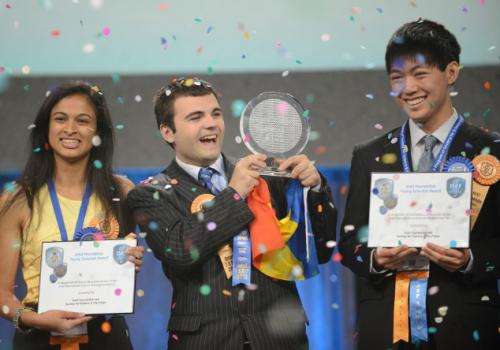May 20, 2013 report
High school student develops supercapacitor, wins Young Scientist Award

(Phys.org) —Saratoga California high school student Eesha Khare is a co-winner of this year's Young Scientist Award sponsored by Intel. She won the award for her battery-sized supercapacitor design which allows for recharging in just a few seconds. The award was part of Intel's International Science and Engineering Fair.
Khare's supercapacitor is meant to serve as a replacement for a small battery, specifically those used in cell phones. She says the inspiration for her design came out of frustration from constantly finding her cell phone battery dead. The supercapacitor she developed is small enough to fit inside a standard cell phone battery housing, and can be fully charged in just 20 to 30 seconds. As if that weren't enough, it also has a much longer useful life offering 10,000 charge/recharge cycles instead of the 1,000 available now for batteries. The supercapacitor is based on nanochemistry, which Khare told the crowd during her acceptance speech is her main area of scientific interest.
As cell phones have grown smarter and more powerful, concern has grown over the ability of battery development to keep up. Khare's supercapacitor suggests that perhaps there is a better way. Capacitors are devices used to store an electronic charge—though typically little more than conductors separated by an insulator, they are an essential component of most electronic devices. They help regulate the flow of electricity. They can also be used as a battery, however, as Khare's device demonstrates. Thus far, hers is only capable of powering an LED, but that is likely to change with advances in nano-technology.
The award comes with a $50,000 cash prize, which Khare will likely use for college; although, this prize might also help her win a scholarship. She plans to continue her research on the supercapacitor with the ultimate goal of replacing her cell phone battery. She noted that such a supercapacitor would also be useful for powering a wide variety of other devices, adding that it's also flexible. It could be used to power devices embedded in clothes, she suggested, or as part of roll-top electronic devices.
More information: www.intel.com/content/www/us/e … ng-fair/winners.html
© 2013 Phys.org




















